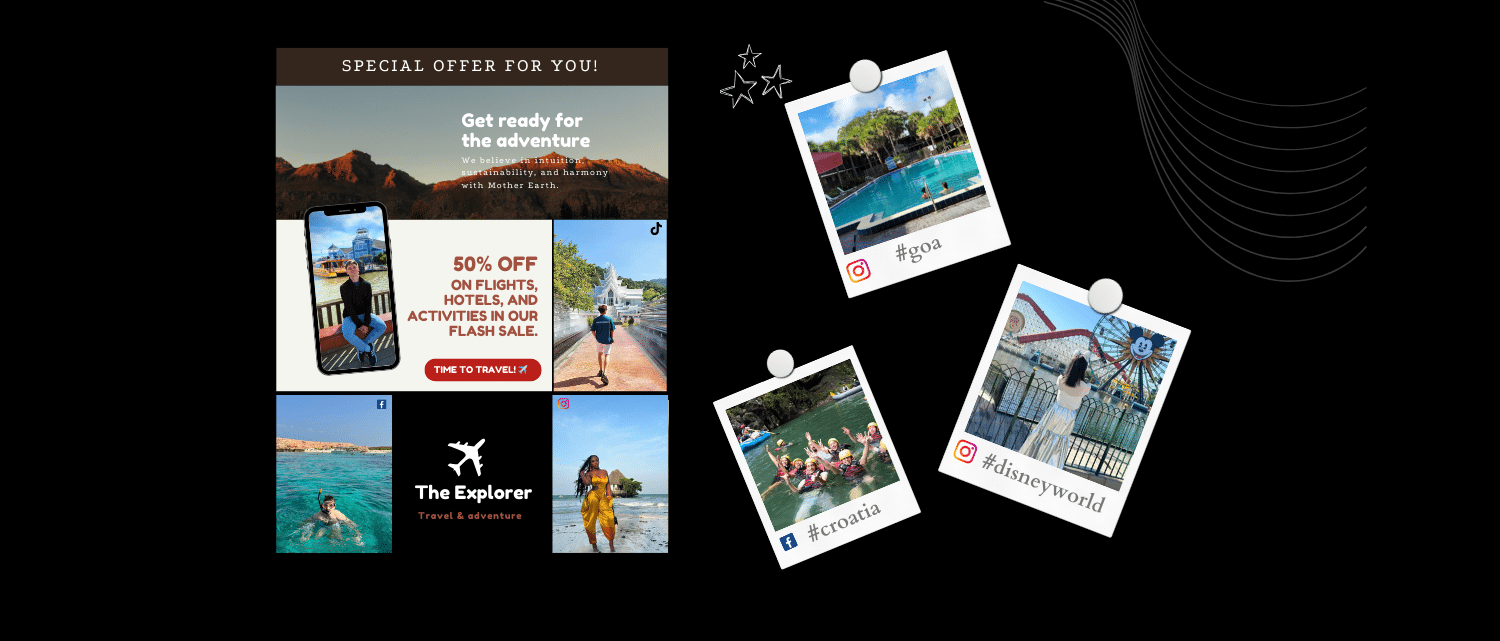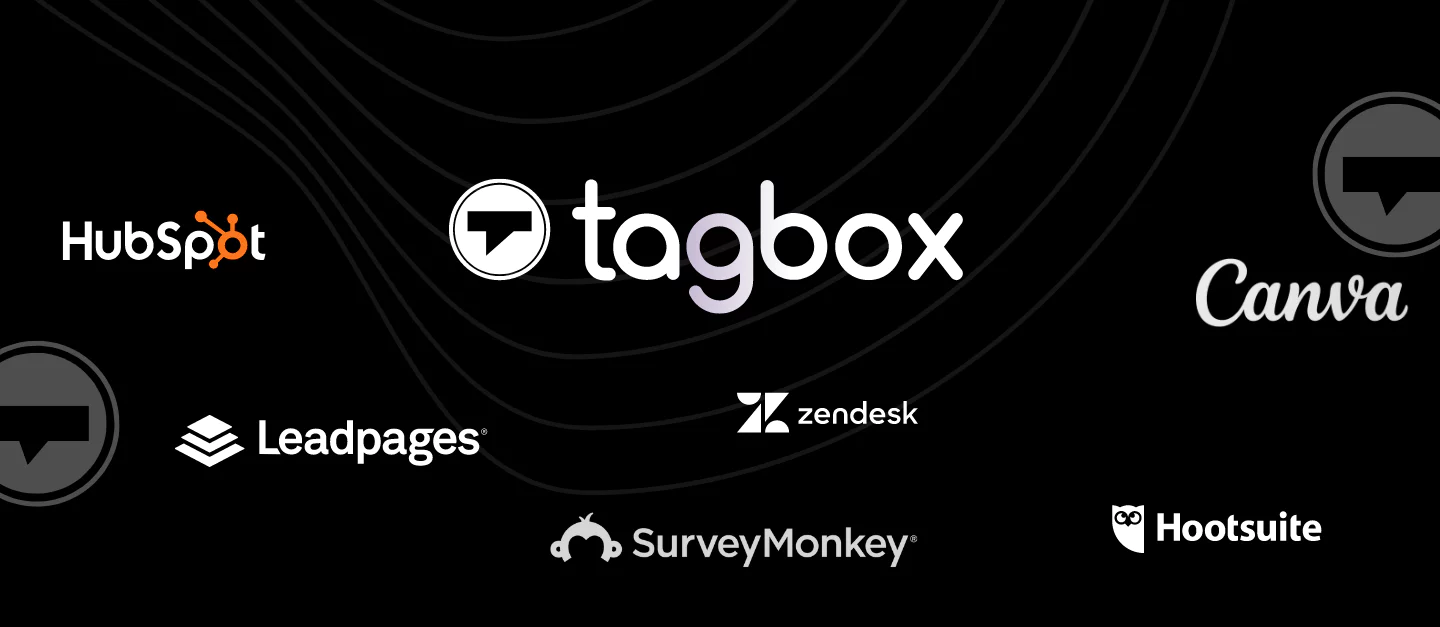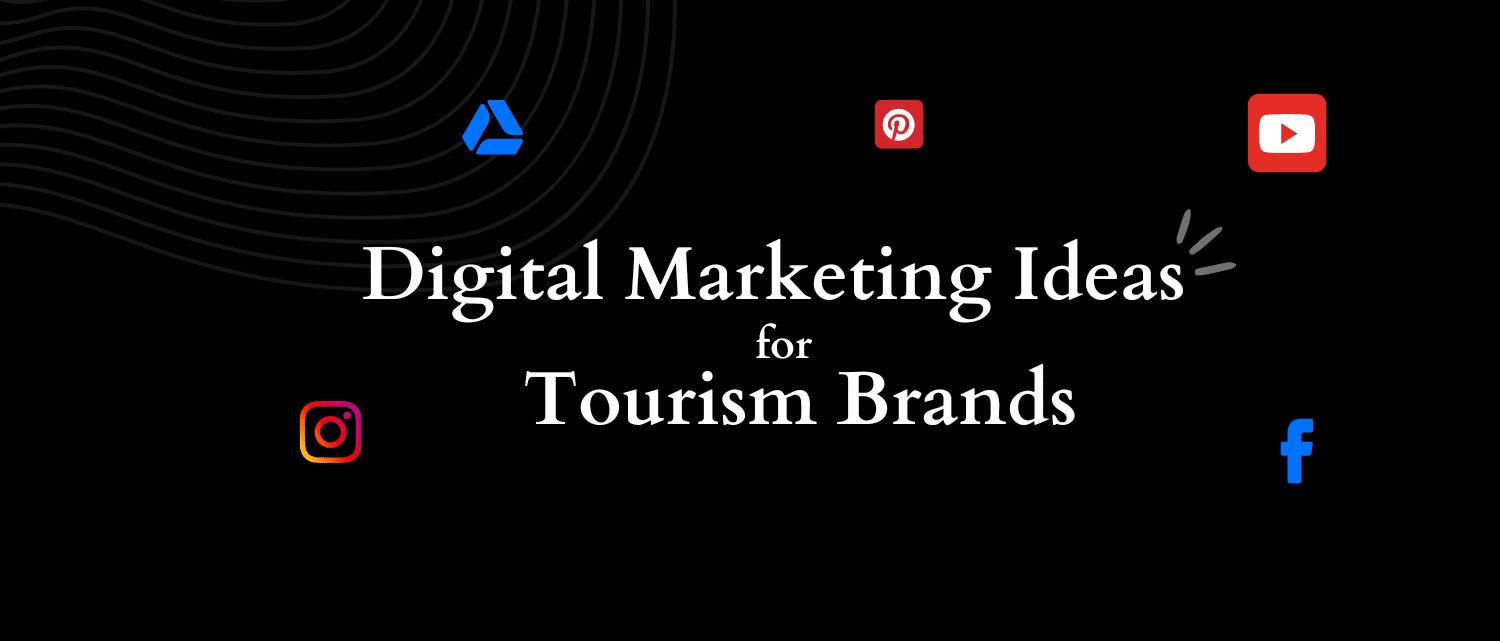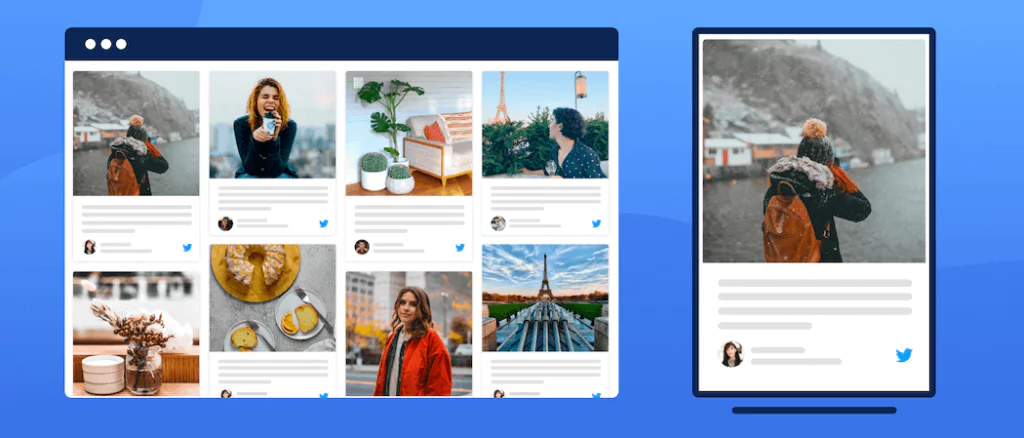Read summarized version with
Tourism marketing is one special form of marketing aiming to sell travel products like destinations, hotels, airlines, tour packages, and experiences. Staying on top of competitors in the travel business is very important. Here’s a breakdown of tourism marketing:
- Promotion of Travel Offerings: Tourism marketing involves marketing, publicity of, and advertising on travel-related commodities, products, services, and facilities to lure tourists. These include UGC marketing campaigns highlighting destinations, accommodations, activities, and experiences.
- Targeted Audience: Tourism marketing is highly specific to potential tourists and travelers. Its target is those who are likely to visit a particular site or participate in a certain mode of traveling.

- Storytelling: A story approach is often effective in tourism marketing. It’s more than just sharing information with tourists; it is concerned with telling stories people will love remembering.
- Visual and Experiential: The other important facet of tourism marketing concerns visual elements like UGC, reviews, and videos. The content should look good because prospective tourists decide based on what they see.
- Emotional Appeal: Tourism marketing is meant to stir up emotions and desires in potential travelers. It’s simply telling people about something, but rather, it inspires them to have the dream visit or experience.
How is Tourism Marketing Different from Traditional Marketing?
| Aspect of Marketing | Tourism Marketing | Traditional Marketing |
| Target Audience | Travelers and potential tourists | General consumers across various industries |
| Seasonality | Depending on travel seasons and specific events | Typically not highly influenced by seasonality |
| Emotional Appeal | Emphasizes emotional connections and experiences. | May focus on rational features and benefits |
| Visual Content | Relies heavily on visual elements (images, videos) | Visual content may vary based on the product or service |
| Geographical Focus | Geographically oriented, often tied to specific locations or destinations | It can be applied to a wide range of products and services |
| Industry Focus | Travel and tourism industry | Broad and diverse industries |
| Sales Approach | Promotes travel-related products and services | Sells a variety of goods and services |
| Impact on Local Economies | This can lead to local economic development and job creation | General marketing may not have the same localized impact |
| Storytelling | Utilizes storytelling to create compelling narratives | Storytelling may be used but less focused on experiences |
| Community Development | Can contribute to the development of communities around destinations. | Typically not directly tied to community development |
Why Is Tourism Marketing Important?
Tourism marketing is crucial in the travel and hospitality industry for several reasons:
1. Driving Sales and Revenue:
- Boosting Economic Growth: Tourism marketing contributes greatly to economic development. This is crucial in attracting visitors, promoting destination, business, and government-related sales, and enhancing revenues.
- More Job Opportunities: From hotels to restaurants, transportation to tour operators, the travel industry is an important provider of job opportunities. Tourism marketing helps to create workplaces, decreases unemployment, and increases the quality of living.

- Revenue Generation: Tourism marketing is one of the important ways to generate revenue by promoting travel-related services like lodging, transportation, attractions, and activities. This revenue helps local shops survive and attracts investors into tourism development.
Case Study – Netherland’s Smallest Island Boosts Tourism with UGC
2. Promoting Destinations and Experiences:
- Destination Awareness: Tourism marketing is an essential tool for highlighting the distinctiveness, culture, natural marvel, and appeal of chosen destinations. Tourism in itself is a huge attraction, educating people about places they don’t know. It is worth mentioning that tourists have various preferences depending on their origin, nationality, family, surroundings, and other factors. For example, if a person is fond of Switzerland’s cultural heritage and enjoys Swiss people and their authentic local dishes, any reputable trekking company will consider this and might suggest Tour du Mont Blanc using the destination awareness marketing approach.
- Cultural Exchange: It fosters cultural exchange and appreciation through tourism marketing. Travelers get to know people’s cultures, habits, and food, which promotes cross-cultural understanding and tolerance.
- Environmental Conservation: Marketing of tourist sustainability can lead to environmental friendliness and responsible visiting. It emphasizes the need for environmental conservation, and this promotes eco-friendly choices of travelers in preserving natural areas.
- Enriching Experiences: The main purpose of tourism marketing is to provide people with beautiful and memorable memories. Effective marketing can make such beach vacations, adventures on a safari, or cultural exploration easier to access and enticing to many.
3. Brand Building and Competing for Attention:
- Brand Identity: Tourism marketing creates a destination or business brand. Destinations and travel-based businesses have stiff competition; they may benefit from having a good brand identity.
- Attracting Tourists: In a competitive world with many traveling choices, tourism marketing is critical in drawing tourists towards a specific destination or business. Potential visitors are assisted in deciding on the experiences that fit their interests and preferences.

- Diversification: Diversification of the tourism offerings could be facilitated by tourism marketing. It can broaden the experience for travelers who would not be lost in the same places again, thus benefiting tourism and local businesses.
Therefore, tourism marketing is important as it helps the travel industry to sell and earn revenue while at the same time promoting destinations and experiences.
Tourism contributes to the economy, fosters cross-cultural exchange, protects the environment, and enhances the tourism experience of tourists.
The Tourism marketing also assists destinations and businesses in creating recognizable brands that can compete with others in the eyes of prospective tourists.
Case Study – The Leela Build Community To Increased Website Engagement
Tourism Marketing Strategies to Increase Your Sales
The world of tourism is changing very fast, and there is a huge competition as each traveler seeks a memorable adventure while every destination tries to stand out. In order to sell more in the travel industry, you need to use a vast set of marketing techniques. Let’s explore these strategies in depth:
Prioritize Personalization
A magician’s wand is personalization in tourism marketing. It entails customizing your marketing towards travelers, considering their preferences individually. Why is this important? It is because it makes your customers feel that they are heard, that they matter, and that their business with you is appreciated.
Embrace Influencer Marketing
Tourism promotion has been greatly fuelled by influencer marketing. Influencers with an interested following can demonstrate your offer to an enormous and specific target group.

Tips on Collaborating with Influencers:
- Find niche influencers who attract a similar clientele as yours.
- Specify clear expectations and regulations for teamwork.
- Assess the success rate for influencer programs by monitoring parameters such as engagements, click-throughs, and reservations.
- You can collaborate with influencers, and they will give authenticity and outreach to a potential traveler in an authentic way.
Facilitate User-Generated Content
Travelers are believed to trust their fellow explorers rather than conventional ads. Tourism currency, i.e., UGC.

Successful User-Generated Content Campaigns:
- Create a hashtag for the guest’s vacation photos and encourage them to share on social media.
- Try to embed user reviews into your website.
- Trust is built, and audiences are connected to real-life experiences by travel UGC. It is strong proof that motivates others to mimic those who came before.

Power Up Your Tourism Marketing with UGC
93% of travelers say that UGC influence their booking decisions
Explore also – What is Destination Marketing
Invest In Paid Marketing Efforts
Pay advertising can drive visibility, which helps you target potential travelers precisely.
Benefits of Paid Advertising:
- There are several benefits associated with this service, one of which is the ability to track your ad campaigns within minutes.
- You may reach certain demographic groups, interests, or localities.
- Measure your ROI using data and analytics.
- Google and Meta Ads continue to provide indispensable solutions for delivering messages to the proper target audience at the exact moment.
- To boost the CTR, try to add UGC to your social ads.
Create a Content Marketing Strategy
Your storytelling tool is content marketing. It helps you tell the stories and the current trends that catch the attention of the Travelers.
Engaging Content Tips:
- Share travel stories and tips.
- Utilize visual marketing such as videos and photos.
- Monitor new trends in travel and add them to the content.
- The best quality content is informative and evocative of memories and stories.
Focus On the Customer Experience
The only marketing tool at your disposal is the experience of the traveler. Listen attentively to their suggestions and concerns by running NPS surveys and soliciting feedback.
Enhancing Customer Experience:
Address the concerns of customers and improve based on their feedback. Make a feedback mechanism that will allow customers to see how their inputs are materialized. Positive customer interaction builds community, referrals, and repeat business.
Do Not Neglect to Review the Marketing
The trust signals for the digital age are online reviews. Integrate them into your marketing strategies.
Encouraging Reviews:
- You can integrate customer reviews on your website to reduce bounce rate.
- You can take advantage of review management tools like SnapUp.
- Give customers discounts or other unique content that provides reviews about their experience.
- Positive recommendations boost credibility and give people the motivation to book with you.
Use Email Campaigns
It is an effective and affordable method of keeping in touch with customers on the latest developments and providing special offers.

Email Best Practices:
- Split your mailing list of subscribers for specific messages.
- Personalize emails with UGC.
- Include interesting subject lines and attractive visuals.
- Email campaigns done to perfection allow your brand to stay in the minds of previous and potential customers to generate bookings and participation.

Run UGC Powered Email Campaigns
76% of travelers trusting photos and reviews
Analyze Competitors for Missing Opportunities
To this end, the hospitality industry, being competitive and fast-paced, must watch its rivals.
Effective Competitor Analysis:
- Analyze the marketing techniques used by your rivals. It helps to identify their strengths, weaknesses, and potential areas.
- This information helps to fine-tune your marketing efforts and keep you ahead of your competitors.
- You need to analyze your competitors, enabling you to see the gaps in the market, which are untapped opportunities for setting you ahead of other brands in the market.
- Integrating these tourism marketing strategies into your approach will boost your sales and impact the highly competent travel industry.
- The world of travel marketing is never constant; thus, remain creative and agile to ensure your brand has more life.
The Final Word!
To sum it up, tourism marketing is important for increasing sales levels and promoting experience. To boost your sales, consider these strategies:
- Personalize your marketing efforts.
- Engage in influencer relationships for wider dissemination.
- Create authenticity by encouraging user-generated content.
- Paid advertising on Google and Meta can work as well.
- Craft engaging content that retells compelling travel tales.
- Improve the customer’s experience through a focus on customer feedback.
- Use incentives and online reviews.
- Utilize email campaigns effectively.
- Carry out competitor analysis to have an edge.
Adopting these strategies can significantly improve your tourism marketing efforts and sales.








